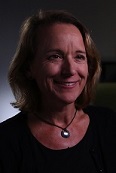The Age of Information and the Fitness of Scientific Ideas and Inventions
- Brian Uzzi Northwestern University, Evanston, IL, USA
Abstract
Science’s knowledge base is expanding rapidly, but the breakthrough paper rate is narrowing and scientists take longer to make their first discoveries. Breakthroughs are related to how information is recombined, yet it remains unclear how scientists and inventors forage the knowledge base in search of tomorrow’s highest impact ideas. Studying 28 million scientific papers and 5 million U.S. patents, we uncover 2 major findings. First, we identify “Darwin’s Conjecture,” which reveals how conventional and novel ideas are balanced within breakthrough papers. Second, we find an “information hotspot.” The hotspot is that cluster of papers of a certain age distribution in the knowledge base that best predict tomorrow’s hits. Together, works that combine knowledge according to Darwin’s Conjecture or forage in the hotspot double their odds of being in the top 5% or better of citations. These patterns result in over 250 scientific and technology fields, are increasingly dominant, and outperform other predictors of impact, suggesting a universal link between the age of information and scientific discovery.
Short Bio
 Brian Uzzi is the Richard L. Thomas Distinguished Professor of Leadership at the Kellogg School of Management, Northwestern University. He also directs the Northwestern University Institute on Complex Systems (NICO) and is a professor of sociology and management science at the McCormick School of Engineering. His research examines the role of complex systems and social networks in promoting outstanding human achievement, creativity, and crowd behavior. Brian has won 13 teaching awards and been on the faculty of Harvard University, INSEAD, University of Chicago, and UC Berkeley where he was the Warren E. and Carol Spieker Professor of Leadership. His work has won several distinguished research prizes and has been features in the WSJ, Newsweek, Inc., on Television, and in the New Yorker Magazine.
Brian Uzzi is the Richard L. Thomas Distinguished Professor of Leadership at the Kellogg School of Management, Northwestern University. He also directs the Northwestern University Institute on Complex Systems (NICO) and is a professor of sociology and management science at the McCormick School of Engineering. His research examines the role of complex systems and social networks in promoting outstanding human achievement, creativity, and crowd behavior. Brian has won 13 teaching awards and been on the faculty of Harvard University, INSEAD, University of Chicago, and UC Berkeley where he was the Warren E. and Carol Spieker Professor of Leadership. His work has won several distinguished research prizes and has been features in the WSJ, Newsweek, Inc., on Television, and in the New Yorker Magazine.
Scalable Collective Reasoning for Richly Structured Socio-Behavioral Data
- Lise Getoor University of California, Santa Cruz, CA, USA
Abstract
Online data from weblogs and social media provide richly structured socio-behavioral data. However, using noisy and incomplete data from social media often requires inferring unobserved attributes of individuals and their relationships. And doing this correctly requires complex collective reasoning about dependencies among those individuals. In this talk, I will describe some common inference patterns needed for socio-behavioral networks including: collective classification (predicting missing labels for nodes), link prediction (predicting edges), and entity resolution (determining when two nodes refer to the same underlying entity). I will then describe in detail probabilistic soft logic, a highly scalable open-source probabilistic programming language being developed within my group to solve these challenges.
Short Bio
 Lise Getoor is a professor in the Computer Science Department at the University of California, Santa Cruz. Her research areas include machine learning, data integration and
reasoning under uncertainty, with an emphasis on graph and network data. She has over 200 publications and extensive experience with machine learning and probabilistic modeling
methods for graph and network data. She is a Fellow of the Association for Artificial Intelligence, an elected board member of the International Machine Learning Society, serves
on the board of the Computing Research Association (CRA), and was co-chair for ICML 2011. She is a recipient of an NSF Career Award and ten best paper and best student paper
awards. She received her PhD from Stanford University in 2001, her MS from UC Berkeley, and her BS from UC Santa Barbara, and was a professor in the Computer Science Department
at the University of Maryland, College Park from 2001-2013.
Lise Getoor is a professor in the Computer Science Department at the University of California, Santa Cruz. Her research areas include machine learning, data integration and
reasoning under uncertainty, with an emphasis on graph and network data. She has over 200 publications and extensive experience with machine learning and probabilistic modeling
methods for graph and network data. She is a Fellow of the Association for Artificial Intelligence, an elected board member of the International Machine Learning Society, serves
on the board of the Computing Research Association (CRA), and was co-chair for ICML 2011. She is a recipient of an NSF Career Award and ten best paper and best student paper
awards. She received her PhD from Stanford University in 2001, her MS from UC Berkeley, and her BS from UC Santa Barbara, and was a professor in the Computer Science Department
at the University of Maryland, College Park from 2001-2013.
Computational Methods for Team Formation
- Evimaria Terzi Boston University, Boston, MA, USA
Abstract
he performance of a team depends not only on the abilities of its individual members, but also on how these members interact with each other. Inspired by this premise and motivated by a large number applications in educational, industrial and management settings, team-formation problems aim to engineer teams that are effective and successful. In the talk, we will discuss computational approaches to team-formation problems and highlight the connection of these approaches to models of social theory that capture team dynamics.
Short Bio
 Evimaria Terzi is an Associate Professor at the Computer Science Department at Boston University. Before joining BU in 2009,
she was a research scientist at IBM Almaden Research Center. Evimaria has received her Ph.D. from University of Helsinki, Finland and her MSc from Purdue University. Evimaria is a
recipient of the Microsoft Faculty Fellowship (2010) and the NSF CAREER award (2012). Her research interests span a wide range of data-mining topics including algorithmic problems
arising in online social networks, social media and recommender systems.
Evimaria Terzi is an Associate Professor at the Computer Science Department at Boston University. Before joining BU in 2009,
she was a research scientist at IBM Almaden Research Center. Evimaria has received her Ph.D. from University of Helsinki, Finland and her MSc from Purdue University. Evimaria is a
recipient of the Microsoft Faculty Fellowship (2010) and the NSF CAREER award (2012). Her research interests span a wide range of data-mining topics including algorithmic problems
arising in online social networks, social media and recommender systems.
Network structure and information diffusion
- Lada Adamic University of Michigan, Ann Arbor, MI, USA
Abstract
In this talk I will describe several studies on information diffusion focusing on structure of the cascade and the underlying social network. The structure of the underlying social networks affects the composition of the information that reaches us. Due to the many contexts in which social ties form, the diversity of social ties corresponds to diverse exposure. Furthermore, the initial structure of an information sharing cascade reveals whether the information is diffusing socially, and then if it is diffusing broadly or narrowly, both of which allow one to predict how much more it will grow, and whether it is likely to recur. Finally, I will discuss insights that can be gleaned by studying social ties within and between communities.
Short Bio
 Lada Adamic leads the Product Science group within Facebook's Data Science Team. She is also an adjunct associate professor at the University of Michigan's School of Information
and Center for the Study of Complex Systems. Her research interests center on information dynamics in networks: how information diffuses, how it can be found, and how it
influences the evolution of a network's structure
Lada Adamic leads the Product Science group within Facebook's Data Science Team. She is also an adjunct associate professor at the University of Michigan's School of Information
and Center for the Study of Complex Systems. Her research interests center on information dynamics in networks: how information diffuses, how it can be found, and how it
influences the evolution of a network's structure







